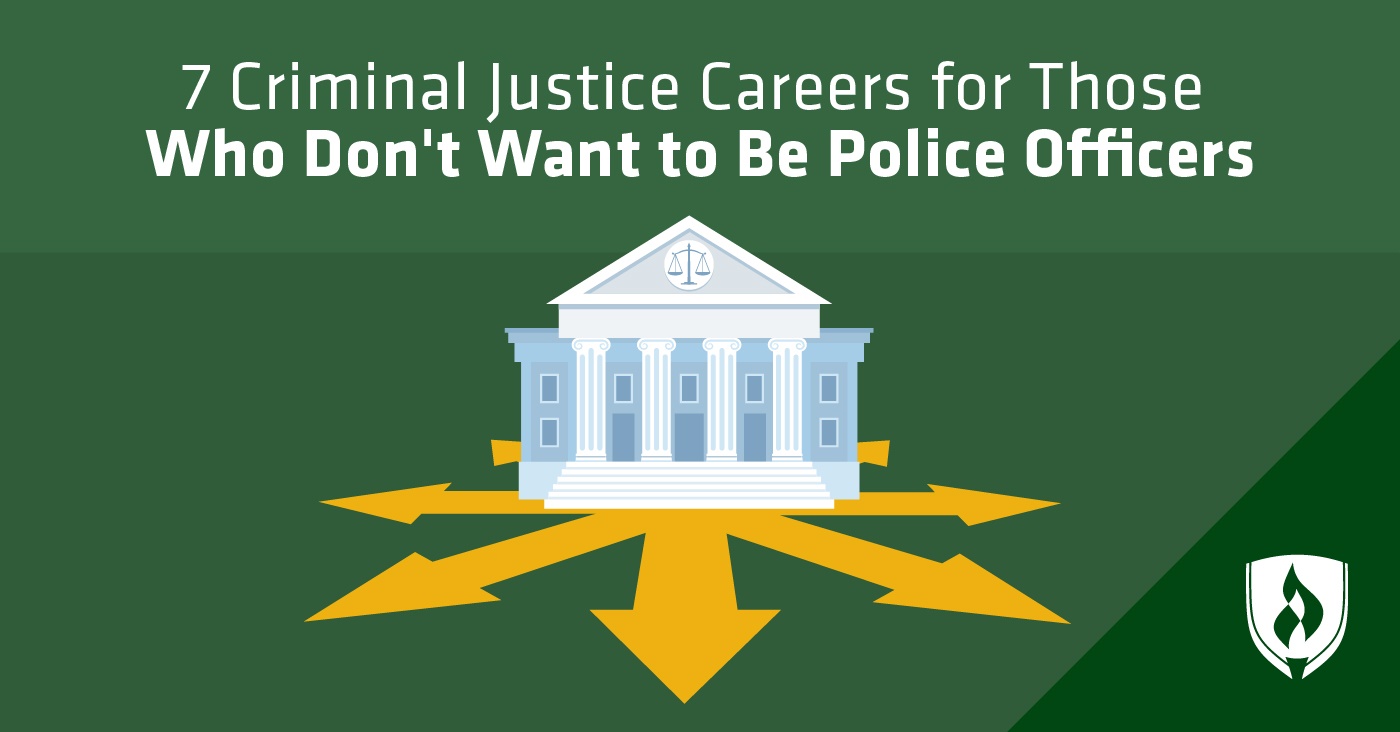7 Criminal Justice Careers for Those Who Don't Want to Be Police Officers
By Callie Malvik on 11/02/2020

You were fascinated by superheroes as a kid. Time after time, heroes and heroines would swoop in to save the day, and good would always triumph over evil. Your childhood dream of being a superhero when you grew up may have changed, but that doesn’t mean you can’t still work in a field that allows you to make the world a better place.
Criminal justice careers are home to real-life superheroes who spend their days protecting citizens and ensuring that justice is served. Many people automatically think of police officers when they think of criminal justice, but there are many criminal justice jobs that don’t require the police academy.
We rounded up seven worthwhile criminal justice careers that might be right for you, even if becoming a police officer isn’t up your alley. Take a look—one of these could just be your next job title. And if you're considering studying criminal justice, don't forget to explore our article on "What Should I Know Before Studying Criminal Justice?" for important insights and considerations before embarking on this educational journey.
7 Other criminal justice careers worth considering
There are some jobs similar to police officers, and there are others that work alongside them within the justice system. Learn more about the options—one of them could just be your next job title.
1. Probation or parole officer
Probation officers work with people who have been placed on probation instead of being sent to jail or prison, while parole officers help people who have recently been released from prison to assimilate to everyday life. Both criminal justice professionals work closely with their charges, frequently visiting them to offer counsel, monitor their progress and ensure that they’re not a danger to society. They’ll also connect them with any additional resources they may need, such as drug rehabilitation or job-seeking assistance.
How do they impact their community? Probation and parole officers act as guides for those under their supervision. They work hard to keep former offenders on the right path so they can create a new life for themselves and become contributing members of the community.
2. Court clerk
While not the most hands-on job in the criminal justice field, court clerks play an important role in keeping legal proceedings moving. They are responsible for handling a variety of administrative and clerical duties in a courthouse. They prepare the daily docket of cases, record depositions, process payments for court fees and more.
How do they impact their community? Without a well-functioning facility to hold trials and legal proceedings, the justice system gets bogged down. Court clerks are the under-the-radar professionals who ensure courthouses operate smoothly. This role might not capture headlines for good work being done, but they remain a critically important piece of the puzzle.
3. Intelligence analyst
Intelligence analysts, also known as crime analysts, are the super sleuths who gather evidence through surveillance and other intelligence networks to stop crimes before they happen. They put all their skills to work, so they can prevent crimes like money laundering, drug-related violence and terrorism.
How do they impact their community? Intelligence analysts are the unsung heroes of the criminal justice world, keeping us safe in ways we may never know about. These crime-solving pros handle the difficult task of staying one step ahead of those who would otherwise cause harm, making them a valuable part of any community.
4. Private investigator
When a private party needs a mystery solved, these private eyes are on the case. Private investigators are hired directly by organizations or individuals to uncover information about everything from marital infidelity to financial fraud. They follow digital paper trails, interview witnesses, go undercover and perform surveillance to get to the bottom of whatever case comes their way.
How do they impact their community? Private investigators are a valuable resource for people who have been victimized or who suspect a crime. These criminal justice professionals help right wrongs for ordinary citizens in significant ways, such as reuniting a missing person with their family. They can play an instrumental role in assisting those who feel they’ve been wronged in civil cases as well.
5. Security guard
Security guards work to protect their employers from theft, vandalism, trespassing and other illegal activity. These men and women can work anywhere from casinos to shopping malls to government agencies. They monitor surveillance cameras, patrol their assigned areas for suspicious activity and verify that only people with the proper authority gain access to restricted areas.
How do they impact their community? These guards are often the first line of defense in public places, protecting businesses against theft and innocent civilians against banned weapons or other harmful threats.
6. Park ranger
Park rangers are the guardians of our natural resources, including state and national parks and forests. It’s their job to create educational and safe programs for those who wish to explore the wilderness. They point out natural and historic features, plan events and keep both visitors and the environment safe from harm.
How do they impact their community? Nature’s wonders are well worth exploring, and it’s thanks to park rangers that we are able to do so safely. From clearing paths to warning visitors about hazards, park rangers ensure that everyone is able to safely enjoy the great outdoors.
7. Paralegal
Paralegals are part of the support team that assists attorneys in preparing for trial. Their duties include conducting legal research, gathering evidence, preparing reports, filing legal documents and scheduling meetings with witnesses.
How do they impact their community? Paralegals play a vital part in making sure that justice is served and the truth comes to light during trials. Their hard work, organization and stellar research skills are often the foundation of a winning case.
Make a difference with these criminal justice careers
You can be a real life superhero thanks to these criminal justice careers, and you don’t necessarily have to put your life on the line every shift to do so. So whether you’re looking for a job as a police officer or something entirely different, there are many options to make a career out of upholding the law and keeping your community safe. If you're curious about the distinctions between related fields, delve into our article on "Criminology vs. Criminal Justice" to gain insights into the different paths within the criminal justice system.
Now that you know all the options that await you, find out if you have what it takes to excel in this field. Check out our articles “7 Signs You Should Consider a Career in Criminal Justice", and "What is a Crime Victim Advocate? The Journey to Justice Has a Guide".
Related Articles:
- 9 Types of Criminal Investigations You Could Encounter as a Police Detective
- What Does a Court Clerk Do and How Do You Become One?
- What Is the Criminal Justice System? A Closer Look at Its 3 Pillars
- 50 Courtroom Terms You Hear in Your Favorite Legal Dramas
- Cracking Cases with Digital Forensics
Rasmussen College does not offer programs that prepare students for every career profiled in this piece.
The Criminal Justice Leadership and Management Bachelor’s degree and Criminal Justice Associate’s degree programs at Rasmussen College have not been approved by any state professional licensing body, and the programs do not lead to any state-issued professional license. For further information on professional licensing requirements, please contact the appropriate board or agency in your state of residence. Additional education, training, experience, and/or other eligibility criteria may apply.
In Minnesota, the Criminal Justice Associate’s degree program does not meet the standards established by the Minnesota Peace Officer Standards and Training Board for persons who seek employment as a peace officer.
EDITOR’S NOTE: This article was originally published in 2017. It has since been updated.




